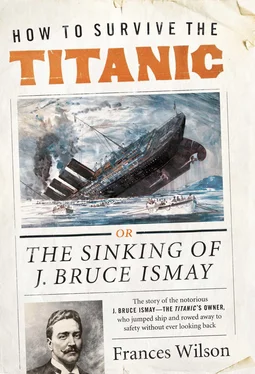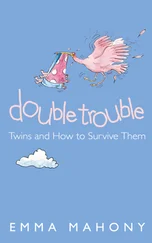Ismay then denied having anything to do with the selection of men who accompanied him in the lifeboat and repeated, to the astonishment of the committee, that his ship was unsinkable, that she was specially constructed to float with any two compartments full of water. I think I am right in saying that there are very few ships — perhaps I had better not say that, but I will continue now that I have begun it — I believe there are very few ships today of which the same can be said. While the press were noting this down, Ismay provided them with another headline: If this ship had hit the iceberg stem on, in all human probability she would have been here today. A gasp went round the room. This was a surprisingly informed conclusion from a man who claimed to have no technical knowledge. The blame for the disaster, Ismay was implying, lay in the instructions given from the bridge. Had Ismay been in the position of Chief Officer Murdoch, who was no longer living, he would not have ordered Quartermaster Hichens, the man at the wheel, to go ‘hard-a-starboard’. He would have taken a risk and continued forward.
‘If she hit the iceberg head on,’ Smith repeated slowly, ‘in all probability she would be here now?’
I say, confirmed Ismay, in all human probability she would have been afloat today.
Smith paused and then opened and read the note passed to him by General Uhler. ‘I understood you to say a little while ago that you were rowing with your back to the ship. If you were rowing and going away from the ship, you would naturally be facing the ship would you not?’
Ismay winced at the suggestion that he had taken the place of a woman and not even rowed with the men. No. In these boats some row facing the bow of the boat and some facing the stern. I was seated with my back to the man who was steering, so that I was facing away from the ship. Uhler, who knew this was not how you rowed, let the issue go. Smith also put the question of Ismay’s conduct in the lifeboat aside for the moment but returned to it that afternoon, when he would ask Lightoller whether Ismay’s claim about rowing with his back to the ship was possible. The loyal Second Officer confirmed that it was.
Ismay was now asked to describe his actions on the evening of Sunday 14 April. At what time did you dine? With whom? Did the Captain dine with you? Did you see any ice? Do you know what proportion of women and children were saved? (I have no idea. I have not asked. Since the accident I have made very few inquiries of any sort.) Did you interfere with the wireless communication when you were on board the Carpathia? (I was never out of my room from the time I got on board the Carpathia until the ship docked here last night.)
Ismay, who had presumably not slept the night before, had been on the stand for three hours. ‘I thank you,’ said Senator Smith, satisfied that his witness was concealing something, ‘for responding so readily this morning, and for your statements; and I am going to ask you to hold yourself subject to our wishes during the balance of the day.’ The newsmen rushed out to file their stories and the audience bent their heads together to confer. Ismay sat down, relieved that the ordeal was over. He would now be able to return home and put this whole business behind him.
The next day a reporter for the New York Times described Ismay as appearing ‘cool and debonair’, fielding Smith’s questions with ‘a smile upon his face’. The New York Tribune noted that he ‘suffered somewhat from an unfortunate mannerism, a somewhat supercilious expression and rather too much evidence of amusement at the “land-lubberly” errors of the committee’. Another paper described him as close to ‘a complete breakdown’. In Washington, Senator McCumber of North Dakota complained that ‘Yesterday, one of the survivors from the lost ship was tried, convicted and executed in the Senate of the United States. I wish to register my protest against this action, and against the condemnation or denunciation of any of the survivors or surviving officers and seamen.’ Senator Newlands meanwhile received a letter from an eminent Boston historian who insisted that ‘Ismay is responsible for the lack of lifeboats, he is responsible for the Captain who was so reckless, for the lack of discipline of the crew, for the sailing directions given to the Captain which probably caused his recklessness’, while J. Pierpont Morgan, on holiday in France, received a wire from his son: ‘Newspapers, which are unspeakably bad, and Congress which is worse, seem to have made up their mind… Ismay is to blame for the whole thing.’ 4
With his scatter-gun style of interrogation, William Alden Smith was authoring the official version of the story of the Titanic, a narrative which would unfold over eighteen days, and fill 1,100 pages of testimony provided by eighty-three witnesses. Ismay, who had thought — as he later said in a statement to the press — that he was needed at the stand simply ‘to ascertain the cause of the sinking of the Titanic with a view to determining whether additional legislation was required to prevent the recurrence of such a disaster’, believed he had furnished the inquiry with the information they required. But Smith showed little interest in Ismay’s authority, and the crowds who pressed themselves into the Waldorf-Astoria had not come to discover the cause of the wreck or to consider how to prevent such a disaster in the future. They were here to see the state of one man’s soul, to observe a man face to face with the horror of his own limitations. ‘I did not suppose’, Ismay complained, that ‘the question of my personal conduct was the subject of the inquiry.’
For Senator Smith, his opening scene could not have been more unexpected, or more pleasing. Here we have the worst shipwreck the peacetime world has ever known, an event discussed in every home from Little Rock to Liverpool, and Ismay, who is lucky enough to be alive, has nothing whatever to say about it. He speaks about what is natural — I came in the natural course of events; you naturally do not start a new ship running at full speed; the natural order is women and children first — and yet his behaviour is entirely unnatural. The instinct of other men was to protect the helpless but Ismay’s was to save himself. Even the direction of his rowing is perverse; it is the wrong way round. In his speech and actions Ismay has been turned inside out. His answers all seem to be endings: That, sir, is all I can tell you; that is all I know; I have no idea; I did not look to see; I really could not say. He speaks only in negatives — never, no, none, not, nothing. He does not know the names of the officers who have died; he does not know how many women and children were left on the ship; he does not know whether the wireless operators are alive or dead — I really have not asked; he does not know how many lifeboats have been picked up; he did not look as his ship went down — I did not wish to see her go down … I am glad I did not… My back was turned to her. Commenting on his replies to questions in the witness stand, several of the next day’s papers ran a list on their front page headed: ‘What Bruce Ismay did not see as he left the Titanic with the women and children.’
‘I saw no passengers in sight when I entered the lifeboat’
‘I did not see what happened to the lifeboats’
‘I did not look to see after leaving the Titanic whether she broke in two’
‘After I left the bridge I did not see the Captain’
‘I saw nothing of any explosion’
‘I saw no trouble, no confusion’
‘I did not recognise any of the passengers on the Titanic as she sank’
Читать дальше












